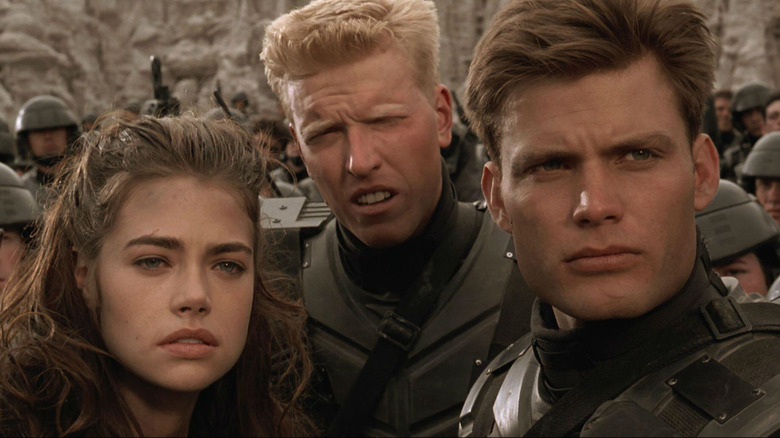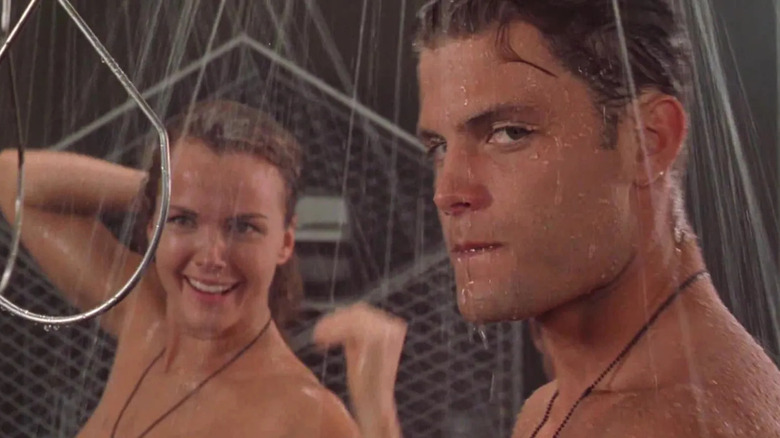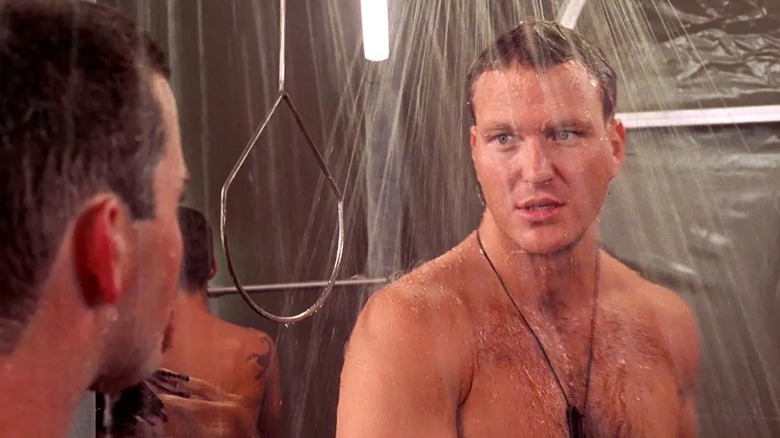Paul Verhoeven Set The Tone For Starship Troopers By Stripping Down In Front Of The Cast
Paul Verhoeven's 1997 war satire "Starship Troopers" was initially greeted with skepticism from audiences and critics alike. Set in a distant future where humanity is engaged in a seemingly permanent war with outsize intelligent insects, Verhoeven made extensive use of clear-throated, pro-military propaganda and clothed his all-too-attractive cast in Nazi-like regalia. With its glorified violence and deliberately idiotic bluster, "Starship Troopers" was very clearly meant to read as a parody of actual fascist filmmaking as seen in Nazi films like Leni Riefenstahl's 1935 film "The Triumph of the Will" and her 1938 film "Olympia." Despite its satirical tone, some critics described "Troopers" as being aggressively pro-fascist, and accused Verhoeven of selling the very military mindset he worked so hard to eschew.
Although the film would go on to make over $120 million at the box office, "Starship Troopers" was considered something of a "lesser" film in 1997, and wasn't held in very high regard. Recall, though, that 1997 was an extraordinarily enormous year for movies, having seen the release of "Men in Black," "The Lost World: Jurassic Park," "My Best Friend's Wedding," "Tomorrow Never Dies," "Liar, Liar," and, of course, James Cameron's "Titanic," the biggest movie of all time (at the time). This was also an era when movies like "The Full Monty" and "As Good as it Gets" could be $300 million hits. Additionally, 1997 saw the release of the Special Editions of three "Star Wars" movies, which were met with much ballyhoo. In comparison, "Starship Troopers" was an odd little drop in the bucket.
Verhoeven's envisioned future was full of bright, attractive faces, steely starships, and heavy weaponry. It was a militant future, devoted entirely to violence. The young, dazzling cast happily became bloodthirsty soldiers and lived together in military camaraderie.
This included showering together.
The shower scene
In "Starship Troopers," Casper Van Dien played Johnny Rico, a square-jawed, bright-eyed high school student who had been taught from a young age to fear and hate a distant species of Arachnids from the planet Klendathu. Every teen is whole-heartedly encouraged to join the military by adults who are missing limbs, lost in the ongoing, generations-long war effort. The Arachnids are never given a voice, and none of the characters seem to know their particular grievance. Verhoeven seems to imply, however, that it was humans that started the war, and that it is now being held in perpetuity, fueling society in an Orwellian fashion.
Johnny and his buddies Dizzy (Dina Meyer), Ace (Jake Busey), and Carmen (Denise Richards) all enlist. Carmen is a space pilot, while the others all fight on the ground. After basic training — and only a small amount of scar-rendering corporal punishment — the troops are able to ship out to the front. In order to depict their closeness as a unit, Verhoeven pictured a co-ed shower scene where men and women mutually and casually strip nude and kibbitz while washing.
In a 2017 retrospective interview with Digital Spy, Verhoeven recalls the shower scene well. A dozen actors had to be nude in the room together and Verhoeven, to take the edge off, elected to strip nude himself. Why ask actors to get nude if he wasn't willing to do it himself? The director was proud of his decision, confirming: "Yeah, sure I did that. And it helped!"
'We need to give an example'
As is sometimes the case with nude scenes in major Hollywood productions, the set is cleared of as many personnel as possible. It seems the only people on set during the shower sequence were the cast, Verhoeven, and his photographer Jost Vacano ("The Lost Honor of Katharina Blum," "Das Boot," "The NeverEnding Story," "RoboCop"). Verhoeven recalls that he and Vacano also getting naked broke the tension any of the actors may have felt, saying:
"My D.O.P. Jost Vacano and I, we undressed and of course then everyone started to laugh. Then we shot the scene with no problem. Jost grew up in these, let's say nudity camps, so he had no problem with it. For me, it was a bit more difficult but I said to Jost, 'Hey, we need to give an example ...' He said 'Of course,' and boom!"
Verhoeven has said in additional interviews that Vacano was born in a nudist colony of some sort, although no online biographies of the photographer have mentioned that. There does appear to be a naturist camp in Osnabrück, Vacano's hometown, called Familien-Sport-Gemeinschaft Osnabrück e.V., but there doesn't appear to be any literature connecting Vacano to this place. The photographer has worked periodically with Verhoeven ever since the director's 1977 film "A Soldier of Orange," and they likely have developed a close friendship. One wouldn't necessarily put it past Verhoeven to spread a harmless, playful fake rumor about a colleague.
Vacano's final film was "Hollow Man" in 2000, and he has retired since.


